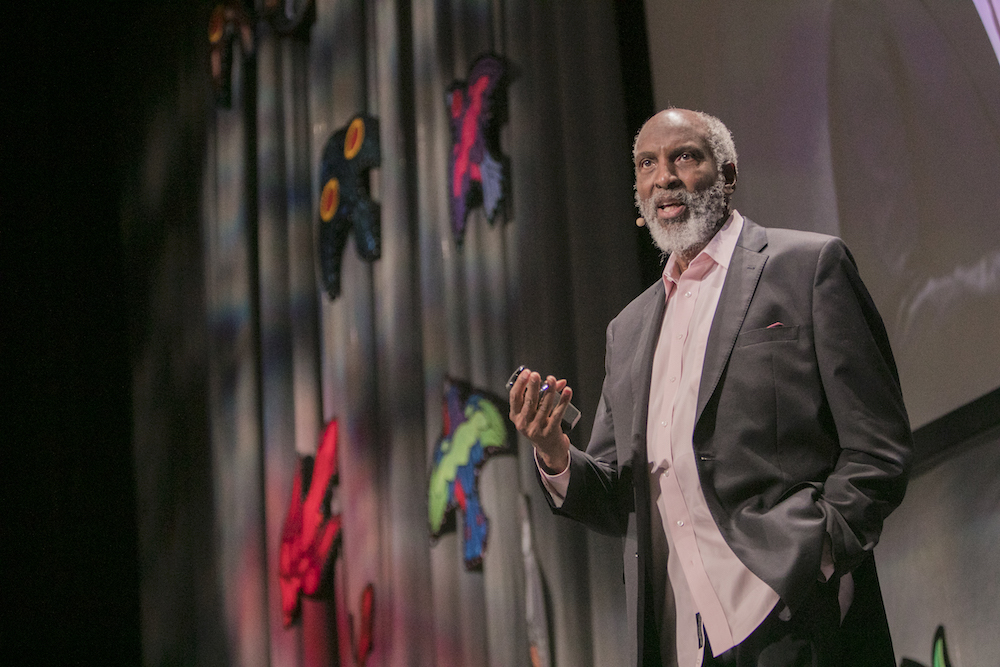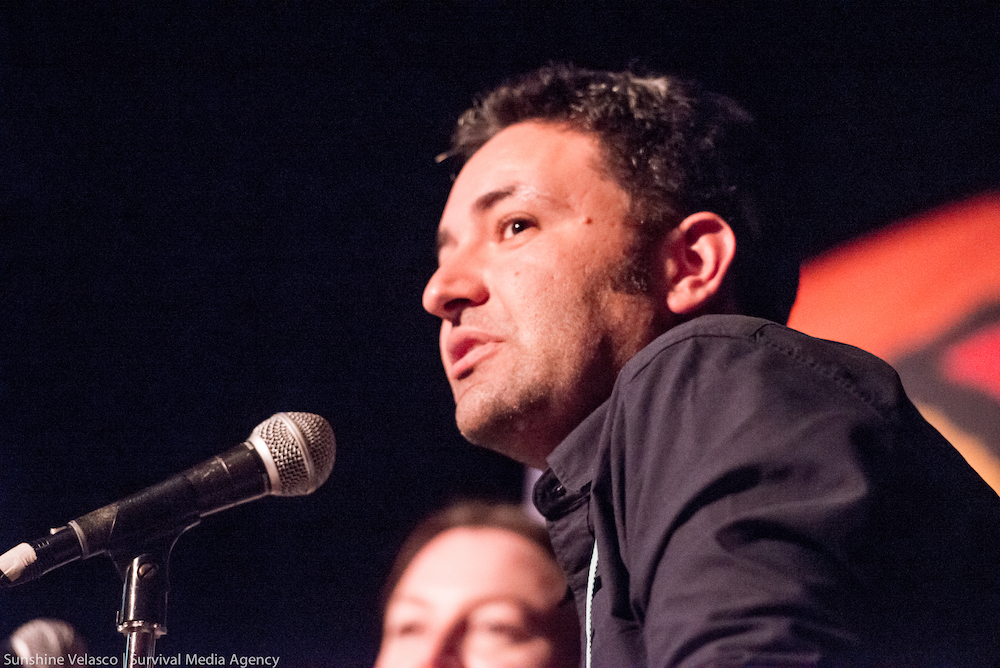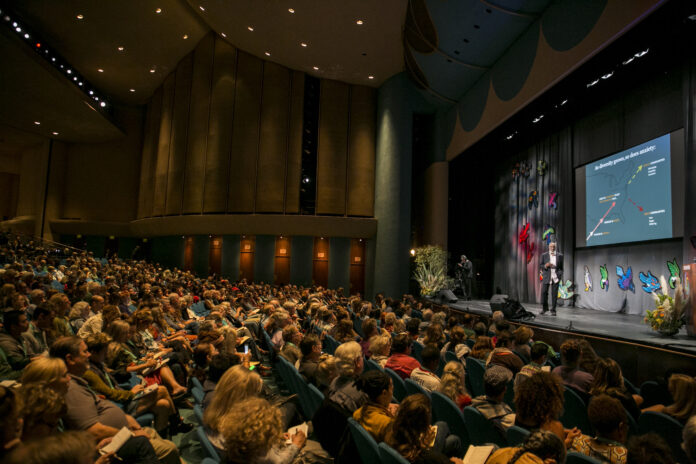If there is a dominant theme to the annual Bioneers Conference, which arrives April 6 to 8 in Berkeley with a rock-’em-sock-’em lineup of thought leaders and events, it is connectivity. In a world splitting into shards along environmental, social, and political faultlines, the 34th edition of the event will have thousands of people at host venue Zellerbach Hall and at venues throughout downtown Berkeley asking vital, prescient questions. And hopefully, offering solid solutions and reasons for hope—about our relationships to ourselves, other people, and the planet Earth.
Founded in Santa Fe in 1990 by social entrepreneurs Kenny Ausubel and Nina Simons, the nonprofit organization Bioneers has become a wildly ambitious hub centered on encouraging human ingenuity, investigative energy, and disruptive, dynamic solutions to enormous global challenges. In addition to the conference, Bioneers has used print and online media, radio series, podcasts, films, books, and third-party cinematic and literary partnerships to broadcast innovation and activism with proven power to effect change. The largest mountains it climbs are the climate crisis, the rise of autocracy, systemic structural racism and injustice, gender bias, societal violence, poverty, collective trauma and entrenched “othering.”
That last topic is close to the heart of john a. powell [he prefers the lower-case spelling of his name], director of the Othering and Belonging Institute and law professor, who will deliver Bioneers’ April 8 keynote address “Belonging without Othering: The Story of our Future.”

In an interview with 48hills one week prior to the conference, powell highlights the ways in which we have become deeply fragmented:
“Othering is a problem because it is seeing someone as not only categorically different, but seeing them as a threat to your group. We build actual walls, then call it apartheid, call it segregation. Othering is built into the physical structure, literally and culturally.”
That conductor of generational wealth, the housing market, is a prime example. “Wealth was created in the White community, but it was suffering from Black wealth[y families] moving in. What do you do? You create separate credit unions for subprime loans; one for Blacks and one for Whites. And now, the largest federal tax program for building affordable housing is almost completely segregated.”
People are also segregated from opportunity, from resources. “In schools, which are largely still segregated, students won’t have the same books, materials, technology,” powell says.
He thinks the first step towards addressing these issues is taking on miseducation about who holds power. powell cites false narratives that have been in place for decades, such as those that say, “People who are homeless are mentally ill, lazy, or violent, and not victims of structures that fail to support their needs. Men hold the power and make the rules and everyone else must follow them. All people want to stay with their own, meaning it is natural to live separated by race, religion, ethnicity, gender preference.” People who say all LGBTQ+ should “get back in the closet,” are particularly thorny to powell.
These false stories are deeply cultural and structural. “They don’t require our constant attention,” says powell. “They are assumptions and unconscious practices that are like water that is flowing. To resist takes a lot.”
Resistance can be realized by building a world based on what we want, and reflecting those values in every possible way; from schools to housing to highways to laws that recognize everybody counts.
“We need to tell and hear stories recognizing we all belong here,” says powell. “It’s not just an idea. How do we arrange our churches, schools, businesses, and practices to see who’s being excluded? [The first key point is that] the speed of how things spread across the planet is new. It used to take longer for ideas to have impact. Now, it’s immediate; that’s positive and negative. Secondly, we must engage and bend our justice. It won’t bend by itself.”

Another Bioneers presenter committed to “clear-eyed, cutting edge” approaches to creating healthy natural systems and communities is Teo Grossman, Bioneer’s senior director of programs and research and a radio producer. A Bioneer since 2014, his interests lean toward renewable energy, and climate change adaptation.
Speaking with 48hills, Grossman says the conference’s program reflects the organization’s longtime investment and extensive focus on supporting youth leadership.
“We give hundreds of fully underwritten scholarships for people aged 13 to 22 to participate, and there are dozens of curated youth leadership activities offered every year,” Grossman comments. “Young people need to be taken seriously—not just as leaders for other youths, but for all of us.”
Grossman says its key for social movements to connect with the enthusiasm of the younger generations. But at the same time, they must leverage the resources provided by people over age 60 by offering support to older folk, and definitely including their impressive knowledge, wisdom and expertise in the search for solutions.
Bioneers has done the same thing by creating a “Community of Mentors” program, connecting young leaders with more established activists to build relationships. The role of elders in the movement is also being honored at Bioneers, through Bill McKibben’s organization Third Act, which is focused on organizing and empowering people in their “third act” of life. Those interested in this line of thinking shouldn’t miss Akaya Windwood’s April 6 Bioneers keynote presentation called “Getting Our (Third) Act Together.”
Grossman emphasizes it is important to be honest that “there’s a lot of bad news.” But having said that, it is equally desirable to hold a conference that presents deep pockets of hope.
“One of the areas I’m really excited about is the realm of our understanding in the science and intelligence of the plant world, of animals, of non-human beings,” he says. “There’s a willingness to ask questions such as, can an animal be intelligent? As we open up what we define as intelligence, we’re learning animals that don’t have extensive neural intelligence can do amazing things.”
National Geographic Explorer and Canadian whale biologist Shane Gero would certainly agree. He will appear at the conference to talk about his extensive research into sperm whales. “[Gero has] looked into their culture and family units, their ability to teach songs, and how those songs are passed from one pod to another,” says Grossman. “What does it mean to try to preserve and protect animals as individuals in a larger system? The natural world is a font of hope and inspirations.”
Each day at the conference begins with a gathering at Zellerbach Hall for a keynote address, dance and music performances, and a choice of morning sessions. Following a lunch break, participants select between panels, interactive sessions, community conversations, and presentations at different venues in a four-block area of downtown Berkeley. The evenings offer films, concerts, and other opportunities.
Among the plethora of topics addressed this year are labor organizing, the return and “rematriation” of Indigenous ancestral territories, clean energy, grassroots women’s Climate Justice initiatives, LGBTQ2SIA+ communities as “Unicorns for Justice,” food justice, climate grief, and intersectional trauma. Presenters and speakers range from leading expert in climate and energy policy Leah Stokes, to award-winning chef and educator Bryant Terry, to author and activist Rebecca Solnit, to STEAM educator and intercultural conversations program manager for Bioneers’ Indigeneity Program Nazshonnii Brown-Almaweri, to President of One Fair Wage Saru Jayaraman, and more.
BIONEERS CONFERENCE April 6-8, $25-449. Various Berkeley venues. For tickets and more information go here.






